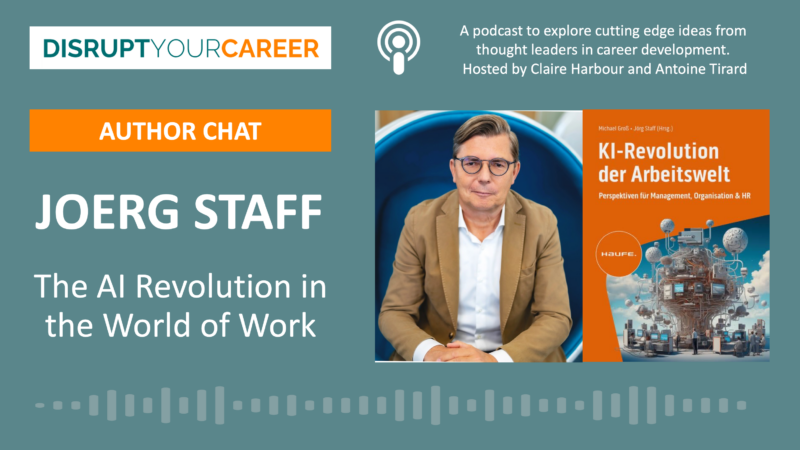
Author Chat: The AI Revolution in the World of Work by Joerg Staff
How will artificial intelligence change the world of work? Joerg Staff explores this important and timely question, providing an overview of the perspectives, strategies, opportunities and risks of artificial intelligence on management, organization and human resources.
In this edition of Author Chat, Disrupt Your Career speaks with Joerg Staff about his book co-authored with Michael Groß, The AI Revolution in the World of Work: Perspectives for Management, Organization and HR (Haufe, May 2024). Their book, currently available in German language, offers highly topical contributions on the applications of AI in the HR field that are already possible today, with concrete recommendations for action and practical examples from well-known companies and institutions. An edited version of our conversation with Joerg follows.
Why don’t we start with hearing why you wrote the book? And what was your process for writing it?
I believe that one of our biggest drivers for the future of work transformation is artificial intelligence. So far, I think we all have used technology as a kind of tool for our work, for automation, to increase our efficiency or to simplify our work. But generative AI, I think, points to a future in which people, work and technology merge. We can even speak of a techno-social trend, which means AI and humans merge, come very close together – they go into a kind of partnership in future. In addition, AI is a universal technology: it influences almost every sector and profession of our work, and so this starts a new era. I think it’s also very important that we all don’t see AI as a bad development, but rather a great opportunity for all of us, for a new type of work that is healthier, more creative, and at least also more productive for everyone. So there are many opportunities in AI for us in the future of work. In this book, we included a lot of experts from science, business and research. As co-authors, we collected all the knowledge available today regarding generative AI in the world of work. So I think it’s a very interesting thing because it covers future trends. the current situation, and the limits of AI, especially when we think about legal, data security and ethical topics. There are also some hints, solutions and best practice examples on how to end these things.
What would you say are the main concepts and messages in the book?
There are some basic messages with regards to the implications of AI, for example, for the labor market, for jobs and for skills. There are also very specific ideas about the impact AI has on topics like ethics, about legal requirements or limitations, and how to handle these topics and issues. But the book is also intended to raise the appetite for AI at the same time, and also to educate or to point out limits, sensitive topics, as well as implications in the world of work. I think it’s also an idea to encourage people to actively engage with the new requirements and the transformation.
Is there any illustrative case study or story that you could share from the book that would give us a flavor of how you’ve written it?
There are some very practical examples, even some best practices. You can use AI in your daily business. For example, in the recruitment area, we share some insights on how some companies use AI in their recruiting process. SAP, for example, relies on an AI based platform called Flynne from Brandmonks. They use a special AI algorithm to automatically search and screen suitable candidates outside of the SAP ecosystem. The platform automates the entire sourcing and recruiting process and provides recruiters with an important summary of candidate skills, even before they meet in person. This is one example and there are many other practical examples where you can use AI in the area of recruitment, writing short descriptions, chatbots for initial interviews, or other things like wider interviews, which are then transcribed and analyzed by AI.
What about the bias that might be built into these AI algorithms that are created probably by the typically white male engineers who are writing it? What have you learned about this aspect?
You are absolutely right. This is also a topic which is addressed in the book and it’s still an issue. I think AI is still in the learning curve regarding this topic. We address this very openly and ask where are the risks – so risk management is also a key topic in the agenda and you can read some more information on that too.
To listen to this Author Chat podcast
Joerg’s LinkedIn profile
Sign up
Sign up to receive regular insightful news and advice on managing your career and receive a free gift. Inspiration delivered straight to your Inbox!
